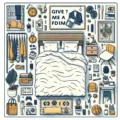Clutter can creep into our lives, filling our homes with items we don’t need or use. Understanding the causes of clutter is the first step towards creating a more organized and peaceful environment. In this article, we’ll explore 12 surprising causes of clutter and provide practical tips on how to conquer the chaos.
1. Excessive Buying Habits
One of the primary reasons for clutter is the habit of buying more than we need. Whether it’s the latest gadgets, clothes, or household items, buying in excess can lead to a surplus of stuff that quickly becomes clutter.
2. Difficulty Letting Go
Many people find it hard to part with items due to sentimental value or the belief that they might need them in the future. This attachment can result in a build-up of unnecessary clutter.
3. Lack of Storage Solutions
Without proper storage solutions, items can accumulate on surfaces and floors, making spaces feel crowded and disorganized.
4. Inefficient Use of Space
Clutter often arises when we fail to utilize our living spaces efficiently. Rearranging furniture and decluttering can open up rooms and create a more harmonious environment.
5. The ‘I Might Need It’ Syndrome
Keeping items ‘just in case’ is a common cause of clutter. Challenge this mindset by asking yourself if you have used the item in the past year.
6. Gifts and Freebies
Items received as gifts or promotional freebies can add to clutter, especially if they are not something you would choose for yourself.
7. Paper Pile-Ups
Unchecked mail, bills, and documents can quickly pile up, contributing to paper clutter. Implementing a digital system for documents can help reduce this type of clutter.
8. Emotional Baggage
Clutter isn’t just physical. Emotional baggage can manifest in our surroundings, causing us to hold onto things that no longer serve us.
9. Time Management Challenges
A lack of time management can result in postponed decisions about what to keep and what to discard, leading to clutter.
10. The Thrill of the Hunt
For some, the excitement of finding a bargain can result in the accumulation of items that are not necessary.
11. Seasonal Decorations
Seasonal items can take up space year-round. Consider downsizing or storing decorations properly to reduce clutter.
12. Multiples and Duplicates
Owning multiple versions of the same item can contribute to clutter. Regularly auditing possessions can help identify and eliminate duplicates.
FAQ
How can I prevent clutter from accumulating?
Prevent clutter by regularly assessing items, avoiding impulse purchases, and implementing smart storage solutions.
Is it better to declutter all at once or gradually?
It depends on personal preference. Some find it effective to declutter all at once, while others prefer to tackle one area at a time.
How often should I declutter my home?
Decluttering at least once a season can help maintain a clutter-free environment.
What should I do with items I no longer need?
Donate, sell, or recycle items you no longer need to keep your space clutter-free and help others.
Can decluttering help reduce stress?
Yes, decluttering can create a more serene environment, which can help reduce stress and improve mental well-being.









